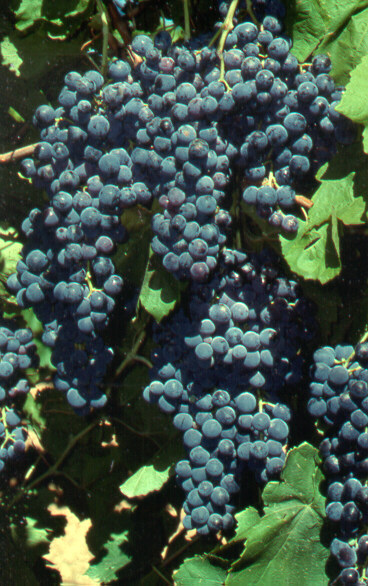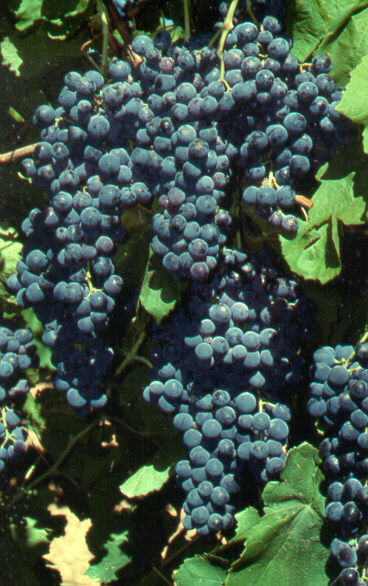
Features
A black seeded wine grape variety, Tarrango is a cross between Portuguese wine grape Touriga, and Sultana, producing a light style of red wine. The specific characteristics include late maturity, high acidity and good flavour.
Tarrango has inherited a rather low fruitfulness in the basal buds of the canes from its Sultana parent, and yields are low with short spur pruning. The variety is suited to mechanical harvesting. The berries, which are a characteristic dark cherry red colour, are fairly large for a wine grape, have small, soft seeds and relatively low grape juice pH.
The variety was selected for late maturity and is usually harvested in North Western Victoria in late March or early April. The composition of fruit at harvest has been around 20 degrees Brix, pH 3.2 to 3.4 and titratable acidity of about 7 g/l. Tarrango may not ripen in cooler grape growing areas.
The young wine settles well and is ready for bottling within two or three months. It has a definite varietal character and without maturation in wood is fresh and fruity, ready to drink soon after bottling. With oak treatment and a couple of years bottle age, a very acceptable standard wine is produced.
Tarrango wines have scored well in controlled tastings and have been well received on more informal occasions.
History
Tarrango was released by the CSIRO in 1975 for industry evaluation and named after a location in the Mallee region of North Western Victoria.
CSIRO's grape breeding program began in 1965, with a focus on producing grapevine varieties that are better suited to the hot inland irrigated areas of Australia.
The variety was developed at the former CSIRO Merbein laboratory near Mildura. The original pollination was made in 1972 by the late Alan Antcliff. A large team of people have contributed to the development of Tarrango, led by Peter Clingeleffer (viticulturist) and George Kerridge (winemaker).

Features
A black seeded wine grape variety, Tarrango is a cross between Portuguese wine grape Touriga, and Sultana, producing a light style of red wine. The specific characteristics include late maturity, high acidity and good flavour.
Tarrango has inherited a rather low fruitfulness in the basal buds of the canes from its Sultana parent, and yields are low with short spur pruning. The variety is suited to mechanical harvesting. The berries, which are a characteristic dark cherry red colour, are fairly large for a wine grape, have small, soft seeds and relatively low grape juice pH.
The variety was selected for late maturity and is usually harvested in North Western Victoria in late March or early April. The composition of fruit at harvest has been around 20 degrees Brix, pH 3.2 to 3.4 and titratable acidity of about 7 g/l. Tarrango may not ripen in cooler grape growing areas.
The young wine settles well and is ready for bottling within two or three months. It has a definite varietal character and without maturation in wood is fresh and fruity, ready to drink soon after bottling. With oak treatment and a couple of years bottle age, a very acceptable standard wine is produced.
Tarrango wines have scored well in controlled tastings and have been well received on more informal occasions.
History
Tarrango was released by the CSIRO in 1975 for industry evaluation and named after a location in the Mallee region of North Western Victoria.
CSIRO's grape breeding program began in 1965, with a focus on producing grapevine varieties that are better suited to the hot inland irrigated areas of Australia.
The variety was developed at the former CSIRO Merbein laboratory near Mildura. The original pollination was made in 1972 by the late Alan Antcliff. A large team of people have contributed to the development of Tarrango, led by Peter Clingeleffer (viticulturist) and George Kerridge (winemaker).
